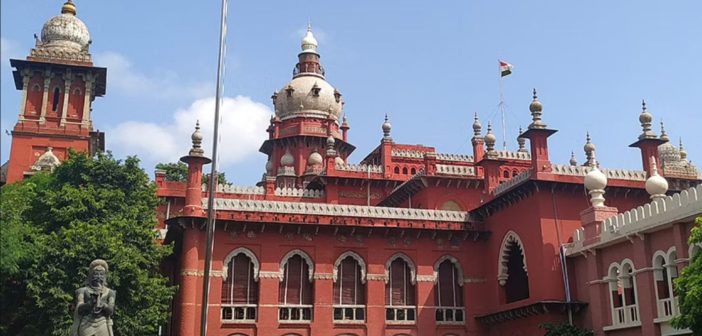In this edition of Court Judgements, we look at the Supreme Court’s judgements on immunity for public servants under Section 6A of the Delhi Special Police Establishment Act 1946, lack of positive viscera report as non-conclusive proof, Calcutta High Court’s judgement on entitlement of students of reserved category, Madras High Court’s judgement on transfer of property and its implied conditions, and Karnataka High Court’s judgement on misusing signed cheques as ‘Cruelty’.
Supreme Court: Striking down of Section 6A of the Delhi Special Police Establishment Act 1946 will have retrospective effect.
In CBI vs. Dr. R.R. Kishore, a constitutional bench of the Supreme Court declared that its 2014 ruling, which found Section 6A of the Delhi Special Police Establishment Act 1946 unconstitutional, will apply retrospectively. This implies that Section 6A is considered to have never been in effect since the day it was added.
A constitutional bench comprising of Justices Sanjay Kishan Kaul, AS Oka, Vikram Nath, Sanjiv Khanna, and JK Maheshwari was hearing a reference made to them in the case of Subramanian Swamy vs. Director, Central Bureau of Investigation and another on whether its judgement that struck down the unconstitutional provision of section 6A of the DSPE Act, 1946 will apply retrospectively. Earlier, this section was struck down as unconstitutional by another constitutional bench.
Section 6A of the DSPE Act mandated that the Central Bureau of Investigation (CBI) needed to obtain prior authorization from the government before commencing any inquiry or investigation into allegations of corruption against officers holding the rank of joint secretary and higher.
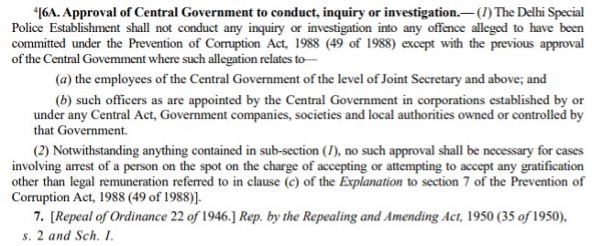
In Subramanian Swamy vs. Director, Central Bureau of Investigation and another case, Section 6A of the DSPE Act, 1946 was struck down as the apex court felt that the ultimate purpose of an investigation is to seek the truth, and any law that obstructs this objective may not pass the scrutiny of Article 14. Further, the Court remarked that the principle of equality before the law does not permit differentiation, based on their status, when it comes to the inquiry or investigation of an offense for which public servants are accused. However, the Constitution Bench did not address whether the determination that Section 6A (1) of the DSPE Act violated Article 14 of the Constitution would be applied retroactively or only prospectively. Hence, these appeals in the court.
Having heard both sides, the apex court held that much emphasis had been laid on Article 13(2) that deals with ‘void’. The word “void” has been interpreted in a number of judgments of the SC beginning in 1951 till recently and it has been given different nomenclature such as ‘non est’, ‘void ab initio’ ‘still born’ and ‘unenforceable’. It relied on a catena of judgements including The State of Manipur & Ors vs. Surjakumar Okram & Ors. where it was held that when a statute is ruled as unconstitutional, it is as if it never existed, and any law found to be unconstitutional, whether due to a lack of legislative authority or a violation of fundamental rights, is void from the beginning. A statute declared unconstitutional by a court of law is essentially invalid from the outset and has no legal standing for any purpose. Further, when a law is declared unconstitutional, it is regarded as “void ab initio,” meaning it was void from the beginning, “still born,” signifying it was never validly established, “unenforceable,” indicating it cannot be applied, and “non est,” suggesting it has no legal existence. Therefore, the invalidated Section 6A of the Delhi Special Police Establishment Act would be deemed to have never been in effect from the date of its enactment.
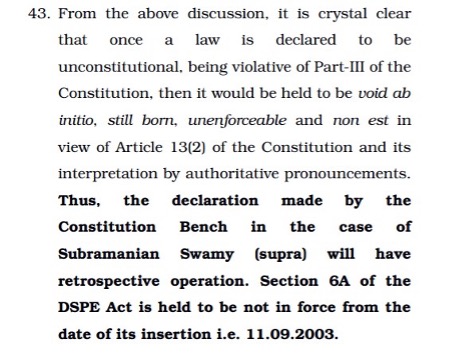
Accordingly, the matter is disposed of.
Supreme Court: Lack of positive evidence of Viscera Report is not a conclusive proof of the fact that the victim has not died of poison.
In Buddhadeb Saha vs. State of West Bengal, the apex court held that the mere absence of poison detection in the viscera report should not be automatically considered as definitive evidence that the victim did not die from poisoning.
A case was presented before the Supreme Court bench, presided over by Justices J.B. Pardiwala and Prashant Kumar Mishra, involving an appeal against a judgment from the Calcutta High Court. In this judgment, the appellants had been sentenced to 7 years in prison for the offense of causing a dowry-related death, as stipulated in Section 304-B of the Indian Penal Code (IPC), and 3 years for acts of cruelty under Section 498-A IPC.
The origins of this case trace back to an FIR initiated by Uma Shankar Shah (PW-1), who served as the de facto complainant. He put forth an accusation that, during Tuli Shah’s marriage, substantial dowry was bestowed upon the husband’s family. However, the appellant allegedly commenced a campaign of relentless harassment, demanding further dowry from Tuli.
Due to the growing torment within her matrimonial home, Tuli Shah, tragically took her own life by consuming poison on 16 September 2011. The Trial Court rendered a verdict, finding the appellant guilty under Sections 498A and 304B, in conjunction with Section 34 of the Indian Penal Code. The High Court subsequently upheld this decision, leading to the appeal before the Supreme Court.
The court heard both sides. It looked at the post-mortem report and remarked that the report is silent on the exact cause of death. However, the report noted the presence of odour material with pungent smell in the stomach and this can be found in cases of poison consumption. Yet, due to delay in sending the viscera samples, the poison may not be detected. Taking reference of some articles in medical jurisprudence and toxicology, and the apex court judgement in Mahabir Mandal and Others vs. State of Bihar, the court held that the absence of poison in viscera would not militate against the conclusion that the death of the deceased was due to poisoning.
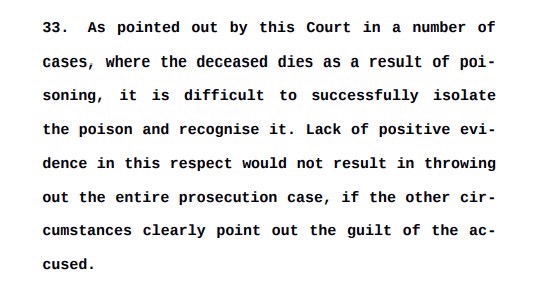
Accordingly, the court does not find justification to interfere in the findings recorded by earlier courts, and hence the appeal is dismissed.
Calcutta HC: Providing relaxations to candidates from reserved categories does not imply that any advantage has been conferred upon them that would disqualify them from being considered in the unreserved category.
In Sahim Hossain & Ors. vs. The State of West Bengal & Ors, the Calcutta High Court held that the relaxation in age and fees should not be interpreted as a means of gaining benefit in the process of evaluating a candidate’s merit and it should not become a disentitlement for them from being considered in unreserved category.
The division bench of the Calcutta High Court comprising Justice Debangshu Basak and Justice Md Shabbar Rashidi was hearing an appeal against the order of the West Bengal Administrative Tribunal that held that persons belonging to a reserved category who took the benefit of age relaxation could not be placed in the unreserved category. The Public Service Commission and the State government were in favour of putting candidates from reserved categories in vacant unreserved seats even though they claimed reservation relaxations regarding age and fee. However, the unsuccessful candidates argued against such a stand. Relying on the apex court judgement in NiravKumar Dilipbhai Makwana vs. Gujarat Public Service Commission & Ors., the Tribunal set aside the recruitment conducted by the West Bengal Public Service Commission.
Looking at the facts of the case, the court looked at the context of the state policy of West Bengal. It remarked that both the 1976 Act and the 2012 Act envision and have established a scenario in which candidates from reserved categories, who are taking part in the selection process, can be included in the merit list within the unreserved category. Such inclusion in the unreserved category will not affect the allocation of reserved category quotas.
Further, the court remarked that the relaxation in age and fees should not be seen as a means of gaining an advantage in the assessment of a candidate’s merit. It is simply a provision that enables a specific segment of society to participate. Assisting this designated section of society in taking part in a selection process should not be equated with granting them special privileges in the evaluation of their merit, particularly when this State did not prohibit the same. The relaxation provided at the initial stage is unrelated to the assessment of a candidate’s merit. The court found fault with the judgement of the Tribunal.
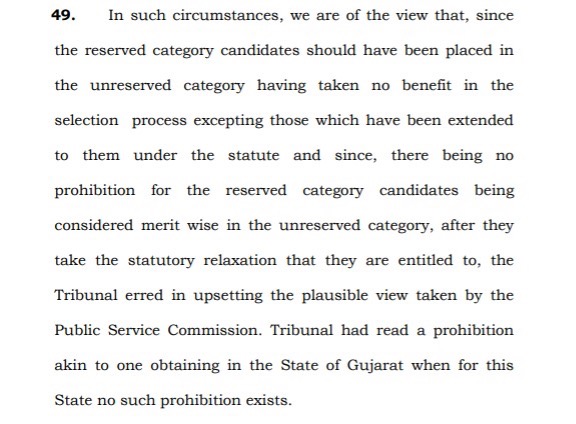
Accordingly, the petition is disposed of.
Madras HC: Love and affection are a deemed condition for transfer or gift of property by senior citizens and its violation leads to declaration of documents as null and void.
In Mohamed Dayan vs. The District Collector and Others, the Madras High Court held that the behaviour of individuals under the Senior Citizen Act should be analysed by considering the connection between the senior citizen and the recipients of the Gift or Settlement Deed. If the senior citizen is not supported subsequently, it would trigger Section 23(1) of the Act, and the Authorities in such situations have the authority to declare the document invalid.
A single judge bench comprising Justice S.M. Subramaniam was hearing a writ petition under Article 226 of the Constitution of India for the issuance of a Writ of Certiorari. The respondent had acquired the property in his name through a settlement deed. However, after obtaining ownership, the petitioner did not provide support to the elderly wife and her husband. Furthermore, the petitioner insisted that they vacate the house, causing significant difficulties for them in leading a peaceful life during their old age. Subsequently, an Executive Magistrate, upon investigating the situation, issued an order nullifying the Settlement deed. This decision was appealed to the District Collector but was ultimately rejected. Hence, the current writ petition.
The counsel for the petitioner argued that the execution of the settlement deed was without any condition and one unregistered consent deed was also obtained from other siblings. In the absence of any such condition, cancellation of the Settlement Deed is in violation of Section 23 of the Maintenance and Welfare of Parents and Senior Citizens Act, 2007.
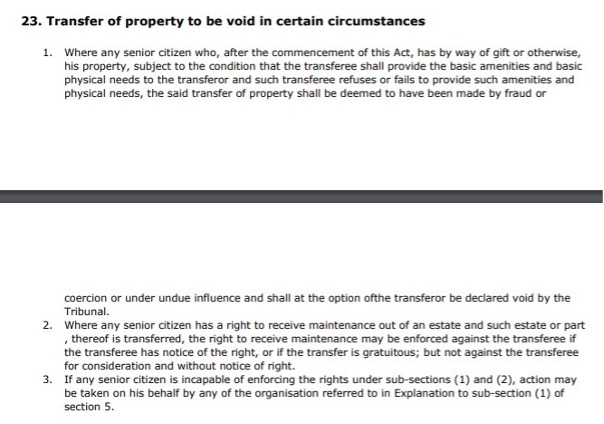
After hearing both sides, the court looked at the apex court’s judgement in S. Vanitha vs. The Deputy Commissioner, Bengaluru Urban District and Ors. This judgement elaborated the scope of Section 23(1) of the Act and the statement of objects and reasons for the enactment of Senior Citizens Act. A close reading of judgements of other High Courts also provides that under section 4(2) of the act, the obligation of the children or the relative, as the case may be, to maintain a senior citizen extends to the needs of such citizen so that senior citizen may lead a normal life. The concept of “normal life” as outlined in Section 4(2) of the Act goes beyond mere existence; it encompasses a life that includes both security and dignity. In the context of Article 21 of the Constitution of India, the right to life encompasses access to decent medical care, adequate nourishment, and shelter provided with dignity and security.
Further, the court remarked that the term “subject to condition” mentioned in Section 23(1) of the Act should be interpreted in light of the senior citizen’s feelings of love and affection toward the individual for whom the Gift or Settlement Deed was executed. “Love and Affection” is an implied condition in the context of Section 23(1) of the Act, and therefore, there need not be any express condition in the Settlement Deed for the purpose of maintaining the senior citizen.
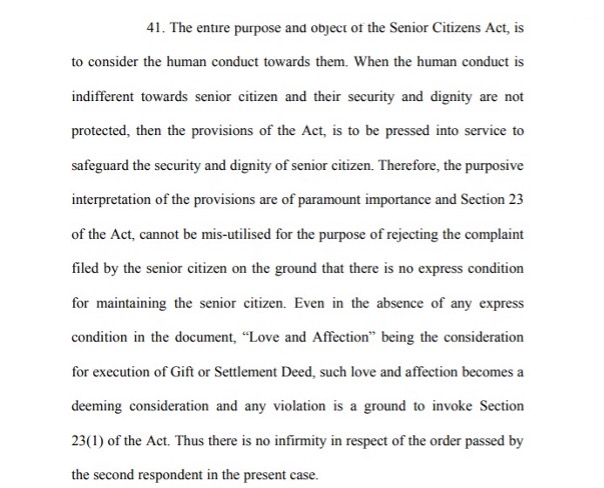
Accordingly, the writ petition is dismissed.
Karnataka HC: Utilizing Wife’s Signed Cheques for Creditors’ Action by Husband is a form of mental cruelty and humiliation.
The Karnataka High Court, in ABC vs. XYZ, held that subjecting wife to creditors action by misusing her signed blank cheques amounts to mental cruelty and humiliation, and hence a ground for divorce.
The division bench of High Court comprising of Justice G. Narendar and Justice Vijay Kumar A. Patil was hearing an appeal petition against the judgment of the family court that dissolved the marriage on grounds of cruelty. The brief facts of the case are as follows. The couple got married in 2003, and the wife accused her husband of being addicted to gambling, betting, and excessive drinking, all while earning an insufficient income to sustain his lifestyle. Allegedly, due to financial difficulties, he began to harass his wife physically and mentally for money. It is asserted that the husband had control over the wife’s bank account and had obtained a loan ranging from Rs.15 to 20 Lakhs by misusing her signed blank cheques. As a result, strangers started coming to their marital home to demand money from the wife. Consequently, the wife filed a petition seeking the dissolution of their marriage on the grounds of cruelty. The family court accepted this petition.
Upon looking at the case, the High Court agreed with the contentions of the wife that the conduct of the husband established that he needed money for his personal habits. Further, the husband has not produced any evidence to disprove the allegations of the respondent-wife on creditors initiating criminal proceedings against her.
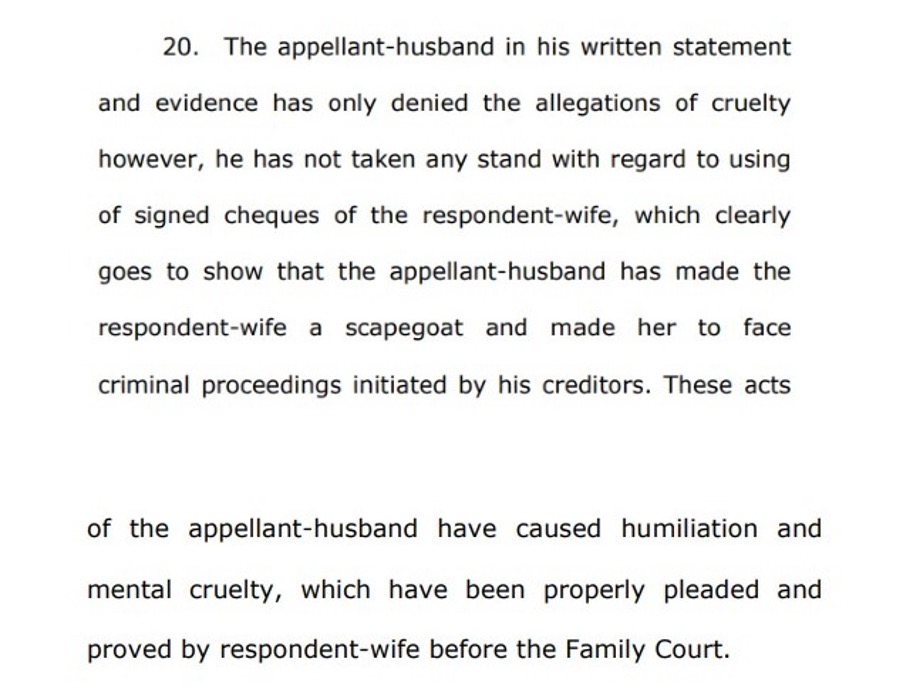
The court agreed with the findings of the family court that the husband had inflicted mental cruelty on the wife and the order of the family court is neither perverse nor contrary to the evidence on record calling for interference in these appeals. Accordingly, the appeals are dismissed.


